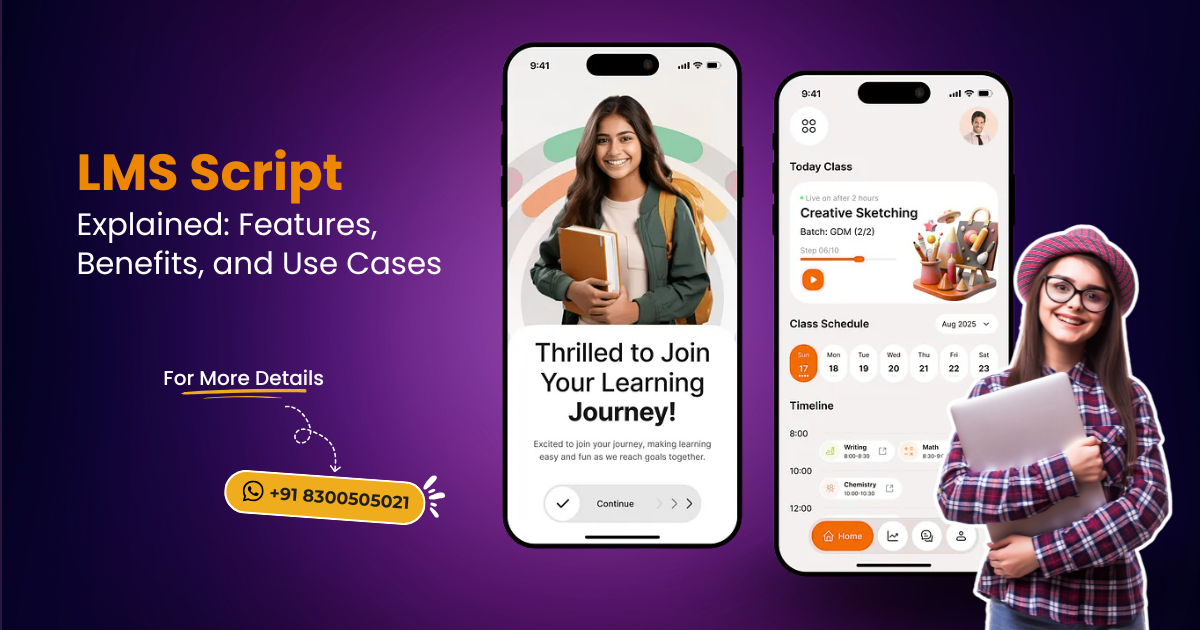Online learning platforms. The online learning platforms evolved from primitive mainframe computer systems and correspondence courses in the mid-20th century to the present, interactive, multimedia-rich, and globally accessible learning environments.
The most notable are the internet and Learning Management Systems (LMS Script), such as Blackboard and Moodle, which emerged in the 1990s, and the MOOC revolution that began in the 2010s, with the likes of Coursera and edX.
The contemporary platforms now integrate the use of artificial intelligence, virtual reality, as well as adaptive learning technologies, which aim to offer personalised and interactive learning processes to learners all over the world.
What Is an LMS Script?
LMS script is the literal computer code, usually in a computer language such as PHP, that is the basis of a Learning Management System (LMS), a computer application platform used to create, deliver, and administer online courses.
These scripts may be open-source (such as Moodle), sold as a pre-built package, or designed to be created in-house to provide a user-tailored online learning platform.
An LMS script (Learning Management System script) refers to an off-the-shelf, customizable software that enables you to create, administer, and provide online courses in the most cost-effective way possible.
Rather than create an LMS with zero, you can just make use of an eLearning script that is ready to be used and contains all the essential features – course creation and payment integration, user management, and analytics.
Moreover, the Learning Management System (LMS) script is a robust program that is meant to facilitate the process of delivering, administering, and monitoring online courses in a manner that has a high level of functionality for both the administrators and the learners.
Also, the main characteristics comprise a strong course and user management, high analytics, interactive tools, and smooth integrations.
Foundational Features
These are the key ingredients towards offering and running courses effectively.
User Management and Roles: The capability to create, edit, and organise users into various groups that are configured to have custom permissions and roles, including an administrator, instructor, and learner.
Course Building and Management: The user is able to create, plan as well and manage course content using different formats, such as documents, videos, and presentations.
The course builder should be a drag-and-drop, which is one of the easy-to-use functions.
Assessment and Certification: Software to design various assessments, including quizzes, exams, automatic grading, and instant feedback.
The system should also be in a position to release and monitor professional certificates at the end of the course.
Mobile Learning and Responsive Design: A user-friendly interface that is completely responsive and can be viewed using any device, such as a desktop, tablet, or smartphone.
This facilitates learning, which is flexible, anytime and anywhere.
Notification and Reminder: It has been enabled with email notification to remind course-related assignments, course progress, and course deadlines to the learners and instructors.
Social Learning: Social applications which enable peer communication, e.g. discussion forums, messaging, and group collaboration functionality.
Blended Learning: Also, Assistance to integrate self-paced online courses with instructor-led, real-time, virtual, or face-to-face courses.
Video Conferencing and Webinars: It will be integrated with live video applications, such as Zoom or Microsoft Teams, in which webinars and online training will be delivered.
Individualised Learning Tracks: Computerised systems that take learners through a tailored track of courses according to their occupations, abilities, as well as their objectives.
Customisation and Branding: The option to white-label the platform by changing the logo, colours, and the general design to suit your brand.
Best Advantages of an LMS Script
The popularity of LMS scripts among startups and educators is not very complex. Also, they are time-saving, cost-reducing, and business-growing methods.
- Cost-Effective Development: Meanwhile, the cost of developing a bespoke eLearning application may be thousands of dollars. An off-the-shelf LMS script is a cheap solution that does not compromise on quality.
- Quick Launch: With the eLearning script, you can be online in weeks and not months. And bringing speed to market is advantageous to start-ups.
- Scalability: It may Regardless of the number of learners you may be starting with, whether 100 or 10,000, a powerful online learning script will effectively manage the increase in traffic.
- High Customisation: Adjust designs, curriculum designs, and cost models to your business objectives.
- Security and Reliability: An effective LMS script comprises data encryption and the use of an SSL certificate, and user authentication to safeguard the information of learners.
- Automation: Also, it provides the automate notifications, enrollments, grading, and certificate delivery – less work on the side of the administrators.
- Seamless Integrations: Enhance your LMS software by using such tools as Zoom, Google Meet, Mailchimp, or CRM systems.
- Healthcare and Compliance: eLearning software is one of the training programs used by hospitals to organise medical personnel, certifications, and compliance.
- SaaS Product Training: LMS scripts are used by software companies in the development of customer education hubs and product onboarding portals.
A Guide to the Selection of the Appropriate LMS Script
The selection of the finest LMS or eLearning script is based on your requirements and objectives. They are,
| Criteria | What to Look For. |
| Scalability | Manages the user expansion effectively. |
| Customization | Complete white-label opportunities. |
| Security | Well-encrypted and user-secured. |
| Integration | Intellectual property supports payment gateways, CRMs, and video calls. |
| Analytics | Critical learner monitoring. |
| Support | Technical support and updates are provided regularly. |
Coursera Clone Script and LMS Script: Migrateshop
One of the best examples of a feature-rich eLearning software solution is the LMS Script, a startup eLearning framework ready to launch, by Migrateshop. Those are,
Highlights Include:
- Possibility to clone a course on Coursera.
- Dashboards between instructors and learners.
- Incorporated payment gateways.
- Report and course analytics.
- White-label branding
- SCORM/xAPI compliance
- SEO-optimised course pages
Migrateshop eLearning script allows you to be flexible and powerful to scale, whether you want to start up a corporate LMS, an academic portal, or an online course marketplace.
Future Trends: LMS Scripts Development after 2025.
The eLearning is a changing environment. Future LMS and online learning scripts will contain:
- Personalization of learning through AI.
- Interactive experiences (gamified).
- The use of VR and AR in immersive lessons.
- Authentication using blockchain-secured certificates.
- Early performance predictive analytics.
- The technologies will transform the way people study, educate and make money online.
Conclusion: Breathe Life into Your eLearning Vision.
In Conclusion, the eLearning business is expanding exponentially, and the secret of its success is the proper technological background. Having a powerful LMS script or a Coursera clone script, it is possible to create a scalable, customizable, and interactive learning ecosystem.
With a powerful eLearning software, you can dominate the education revolution, whether you are starting up a coaching platform, a corporate training portal, or an academic eLearning platform.







